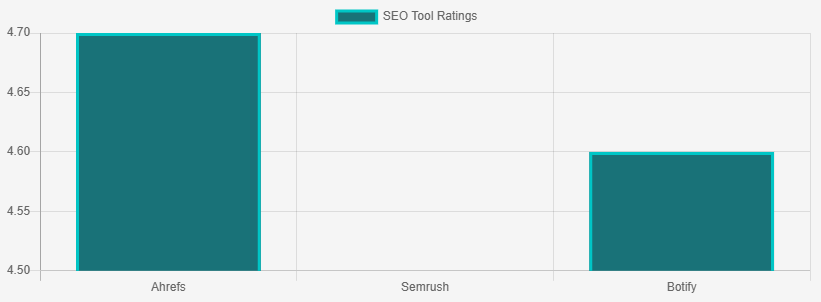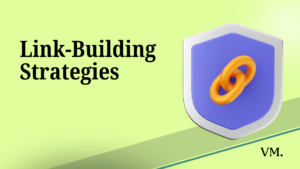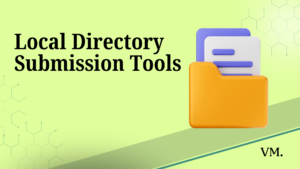In the sprawling world of digital marketing, you need the best enterprise seo tools to amplify your online presence. But, let’s face it, for larger companies managing extensive websites and countless content pieces, standard SEO tools simply don’t cut it. They just don’t have the horsepower.
It’s like trying to run a marathon with flip flops, right? These big companies need tools built for their specific needs to ha large-scale data analysis and complex workflow management.
With that said, you’ll discover the best enterprise seo tools. Plus, you’ll find useful insights, industry best practices, and must-have features to enhance your search engine rankings.

10 Best Enterprise SEO Tools to Level Up Your Marketing
There are several popular options out there, although you must determine which ones meet your company’s specific needs.
Here are my top picks:
1. Ahrefs
Ahrefs takes the crown when it comes to backlinks analysis. They’re famous for their backlink research and comprehensive keyword insights. This means they analyze the pages that link back to your website for quality.
Then, they suggest steps you can take to get more. It’s widely viewed as the best backlinks tool, even Brian Dean calls it the “world’s largest backlink index”. Their extensive features include:
- Keyword Research Across Several Countries and Languages
- Rank Tracking
- Content Optimization
- Free tools for beginners including broken link detection, website authority scoring, and a quick backlink analyzer.
Ahrefs has been a go-to for several digital marketers. Their consistent performance over a decade – well, it says a lot about their expertise and reliability. Take a peek at Ahrefs rankings:
- G2: 4.5 stars.
- Capterra : 4.7 stars.
- Gartner : 4.5 stars.

2. Semrush
I know a ton of folks who swear by Semrush, one of the longest-running seo toolsets. They’ve basically built a one-stop shop that’s easy to navigate, covering many aspects of SEO including website performance and content audits. They really try to touch every base. You’ll get unique solutions in their plans including:
- Content Marketing Tools
- Extensive Database for Keyword Research
- Free Trials. (Although, this might’ve shrunk recently.)
- Solutions for website monetization
- Paid Search Engine Campaign Planning and Analysis
They provide a bird’s-eye view of how your digital efforts are faring in social media and advertising. And, there are custom reports. However, this might not be the right platform if your primary goal is building backlinks or deep competitor analysis, or your company has a smaller budget.
3. Botify
Botify – this is a big one for my personal SEO journey. It really helps you see everything going on with your site. This tool gets deep. They focus on identifying the technical snags that may be dragging down your web performance, such as slow load times or server issues.
It’s not just about uncovering these problems, though – the strength of Botify is in giving actionable steps to fix them, too. Their customized reports and dashboards paint a clear picture of where to improve so you can then get a handle on everything that’s going on.
I’ve personally used Botify at different companies with great success. Botify helped me justify important decisions to stakeholders and teams. You might’ve seen me in their case studies. Here’s my testimonial. We know how Google algorithms prioritize faster sites with fewer errors so this tool helps give you exactly what Google (and your audience.) wants.
4. SearchMetrics
If getting ahead of the game is your business goal, Searchmetrics can help get your teams in the driver’s seat. This tool is excellent for spying on your rivals’ tactics because it delves deep into competitor strategies and identifies hidden market share shifts. Then it shows how to implement similar steps.
Their strengths are in delivering clear, easy-to-read visuals, including:
- Visibility and Market Share Shifts for Competitors
- Comprehensive Ranking Comparisons Across International Search Engines
- Content Generation Guided by Current Search Engine Trends
They go beyond traditional keywords analysis to help you craft effective, compelling content.
5. Google Search Console
For 81.95% of users across the world Google is the primary search engine. That’s one big reason why I know pretty much every website owner utilizes their free Google Search Console (GSC).
This platform provides detailed diagnostics to analyze your SEO performance. The strengths of GSC are in:
- Connecting directly to the biggest player, Google
- Identifying technical errors like broken links, page speed issues, or crawl mistakes, with clear tips on what to fix.
- Integrations with Google Analytics, which can be a massive source for data on your site traffic
I use GSC every week to optimize web performance, although keep in mind that it may need more features for backlink analysis and keyword suggestions if those are priorities.
6. Moz Pro
Moz began as a community platform in 2004 to educate those who want to win in online marketing. Since then, Moz Pro has been the leading toolkit that offers in-depth reports, helping you create winning strategies by leveraging their exclusive Domain Authority (DA) and Page Authority (PA) scores.
Their advantages are in:
- Unique Metrics for Identifying Your Website Authority, such as the Free MozBar browser plugin
- Analyzing competitor strategies in social media
- Comprehensive, actionable steps for website optimization
Along with offering the extensive list of solutions included in paid plans, Moz Pro provides beginner tools. They still host an online forum so SEOs and marketers of different experience levels can share their advice and knowledge, too. Moz pro has several paid plans (some of which allow unlimited users) in addition to offering free resources like an SEO glossary and Q&A tool.
7. Clearscope
In Google’s evolving algorithms, content is the cornerstone. The words on your web pages – they matter to Google and they matter to your target audience. For creating better content that drives high-quality traffic to your website, look at Clearscope. They focus on keyword research to identify trending topics and help analyze competitor strategies, making them an ideal content optimizer for organic SEO. It’s one of the few content optimizers that easily plugs into WordPress.
Here are their core strengths:
- Content grading. Find out immediately how Google sees your text and what can be tweaked for better scoring and indexing
- Unique content topic suggestions to help keep you relevant in the ever-changing content marketplace
- Providing readability scoring. Find out which paragraphs are confusing, too wordy, or written in passive voice – all of this affects your content’s SEO.
- Giving tips on internal links – the secret weapon of savvy content marketing
They work to answer two key questions in one platform; “Is my text readable?” and “Is my text relevant?”.
8. BrightEdge
I’ve found that BrightEdge doesn’t get enough love in SEO – It’s truly a contender. They focus on real-time analysis to monitor how your rankings are performing daily – It’s instant. One standout feature they give their customers is something we don’t hear about too often – They reveal search intent data – that’s unique in enterprise seo solutions.
Their proprietary Data Cube delivers tailored insights based on automated reports generated through:
- Automated Reports, making content and SEO insights accessible across all team levels
- A Comprehensive Site Audit Tool That Analyzes the Health of Your Webpages
- Extensive Backlink Management to Discover Which Pages Are Bringing Traffic.
- Data Cube for fast, actionable insights
9. Lumar
Backed by their in-depth Website Intelligence platform, Lumar goes beyond typical seo to encompass your entire site. This is really a complete site analysis that helps identify everything Google doesn’t want, such as:
- Slow Load times or Errors
- Usability problems
- Site security
- Crawl mistakes or redirect errors.
They are an expert tool designed for engineering, operations, and even accessibility – all in one easy-to-navigate toolkit. You might see it as a sort of preventative maintenance for website health. I’ve worked with similar tools and discovered critical vulnerabilities impacting thousands of URLs. That saved hours of dev time (and company money.) after catching these glitches before website launch. If thorough website reporting is critical – and it should be – take a peek at Lumar.
10. Screaming Frog
If you’ve worked on site buildouts I’m pretty sure you’ve encountered Screaming Frog. – This one’s not afraid to get deep. This tool focuses primarily on the technical stuff Google likes to see by getting into:
- Broken Links and URL Mistakes – You can redirect faulty links to working pages.
- Duplicate content – Find those pages stealing content juice
- Metadata. Your descriptions need proper format – Search engine crawlers see right through errors
There are countless features offered to get technical. The Screaming Frog team knows their strengths – They’ve long opted to stick with the desktop application rather than go cloud. They even offer a free version so it’s one of the top platforms for newer developers who want to dive into what Google (and their search engines crawlers.) prefer to see on your site.
Now that we’ve gotten a deeper understanding of these Enterprise-level tools – well, let’s see some more tips to picking the best tool.
Why Invest in the Best Enterprise SEO Tools?
A whopping 59% of businesses say that using seo boosts their ROI, according to Statista. This shows that people who put effort into professional SEO services are seeing great results for their business. That same Statista research predicts the SEO world will explode and be worth a crazy $122 billion by 2028.
However, not all SEO practices are created equal. When you talk about larger enterprises managing more than a few sites at a time – well, that brings about more challenges and greater competition. For these organizations, picking the right tool makes the difference between surviving and thriving online.
Let’s get into the best features of these specialized tools:
Feature 1: Scale Your Way Up
The third-biggest SEO challenge for 11.9% of marketers? It’s scaling SEO efforts, according to research. Imagine handling countless pages, keywords, and marketing campaigns – this can be a logistical nightmare. It’s basically an information overload situation.
You need tools built to handle massive data, like managing thousands (and millions) of pages simultaneously. Having the best enterprise SEO tools in place will not only handle massive traffic, but these tools make the entire process cost-effective in the long run.
Feature 2: Unlock the Insights You Need
Imagine seeing every corner of your website’s performance in a clear, simple-to-understand way. I know this is one thing every SEO wants, especially those who oversee more complex website builds. You need insights on traffic flow, user behavior, conversion metrics, and areas needing improvement all at once.
The best enterprise seo tools do all of this. Plus, they will track how your keyword research is driving clicks and revenue. This shows how a successful seo playboook delivers tangible results.
Feature 3: Collaboration Across Your Teams
Websites need consistent updates and adjustments because SEO is a very dynamic game with the constant evolution of search engine algorithms. The companies who excel at enterprise SEO rely on dedicated teams because no single person can manage everything that comes up – especially as these projects become complex.
The best enterprise seo tools give these specialists what they need: efficient workflows and clear communication on shared tasks. There is real-time collaboration without all the unnecessary roadblocks.
Feature 4: Integration That Makes Things Easier
Imagine starting your SEO effort from square one every time Google tweaks their algorithm – I know we don’t want to do that. The best enterprise seo tools integrate smoothly with your website’s platform and the different digital marketing software you’ve been using. Enterprise-level digital campaigns rely on interconnected tools for success.
My Summary
I’ve said this before: Choosing the best enterprise seo tools is about a lot more than simply going with industry darlings like SEMRush or Google Analytics. Every business has unique needs. Their goals and the size of the project are what make the biggest difference.
That’s what’s really important when comparing various Enterprise seo tools and it’s even better to request free trial offers first. It will give a business that extra assurance knowing the tool works.
By doing this, you’re empowering the SEO teams, elevating company rankings, and ultimately giving everyone what they’re searching for.
FAQs
For an SEO platform to truly earn that "enterprise level" label, well, it must have features specifically made for larger businesses with complex needs. I think these features show up in how their tools:
- Handle Massive Volumes of Data, like for Websites Containing Millions of Pages. It should all be easy to use.
- Provide In-Depth Data with Clear Reporting Across Multiple Websites and Various Departments.
Yes, because unlike their smaller rivals - well, these toolkits are custom built for large organizations managing tons of webpages or content at the same time. Here are a few points of difference:
- Advanced features such as competitor research, keyword ideation, and international seo performance.
- Deeper reporting with custom-tailored options. Deliver these data-driven insights in reports to different users. This saves teams a bunch of time.
- Scalability is built into everything because enterprises are always evolving with constant market trends.
They're made for managing complexity. They go way beyond the basic services to empower businesses. Think of it this way: Enterprise level tools are the heavy lifters.
The use of top SEO programs directly leads to success and increased market performance. Here's how companies are taking advantage:
- Reaching Wider Audiences
- Brand Awareness, which drives customer loyalty.
- Conversion Rates go up. - A site performing well in search engines - that builds confidence
SEO reporting relies heavily on data analysis and uncovering those telling numbers that reveal your overall website performance, which we can think about with the following:
- Backlinks: Websites that Link to Your Content - Google Sees this as "Popularity."
- Traffic: The Number of Daily Website Visits
- CTR, or How Many Users Who View Your Site (through Search Engines or Ads.) actually Go To it - These metrics measure user engagement.
- Conversion Rate is all about who is coming to your website, reading your content, and actually doing what you want them to. - That might mean buying products, scheduling consultations, or contacting your service.
I have found that enterprise level platforms integrate many (if not all) of these must-have tracking tools and deliver the key performance indicators to your inbox. These advanced analytics will be your trusted compass in making those critical business decisions.
Enterprise SEO tools are advanced software platforms designed to help large organizations manage and optimize extensive websites, handle large-scale data analysis, and streamline complex SEO workflows. They offer features beyond standard SEO tools, such as deep technical audits, large-scale keyword tracking, and collaborative capabilities for teams managing thousands or millions of pages
Standard SEO tools often lack the capacity to handle the scale and complexity of enterprise websites. Enterprise tools are built for high-volume data, robust reporting, and workflow management—making them essential for organizations managing multiple sites, vast content libraries, or facing intense online competition
The top picks include:
Ahrefs: Best for backlink analysis and comprehensive keyword insights.
Semrush: All-in-one platform for content marketing, keyword research, and paid search analysis.
Botify: Excels at technical SEO audits and actionable recommendations.
Searchmetrics: Focuses on competitor analysis and market share tracking.
Google Search Console: Free diagnostic tool for technical SEO and integration with Google Analytics.
Moz Pro: Known for unique metrics like Domain Authority and community-driven support.
Clearscope: Specializes in content optimization and readability analysis.
BrightEdge: Offers real-time ranking analysis and search intent data.
Lumar: Comprehensive site health and technical analysis.
Screaming Frog: Deep technical site audits, especially for broken links and metadata issues
Scalability: Ability to manage large websites and massive data sets.
Insightful Reporting: Clear, actionable analytics on traffic, user behavior, and conversion.
Collaboration: Tools that support team workflows and real-time communication.
Integration: Seamless connection with website platforms and marketing software
According to industry research, 59% of businesses report increased ROI from using SEO tools. Enterprise SEO tools help organizations efficiently scale their efforts, uncover new growth opportunities, and make data-driven decisions that directly impact rankings and revenue
Many enterprise SEO tools offer free trials or limited free versions, allowing businesses to test features before committing. For example, Google Search Console is free, and Screaming Frog offers a free version with limited functionality
Share:




